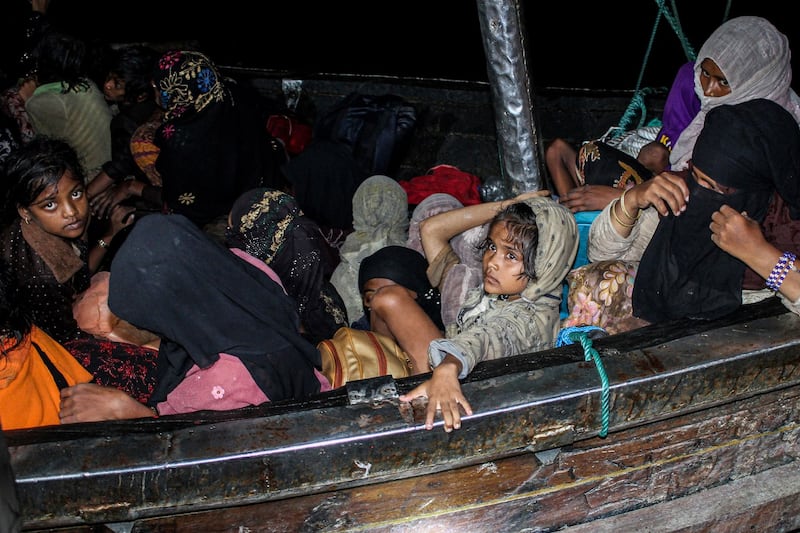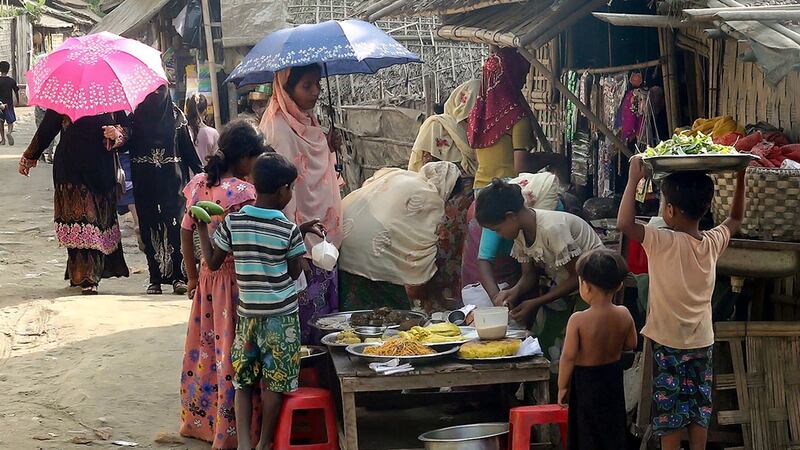Fed up with discrimination, a lack of work opportunities and the deplorable conditions of their village for displaced persons in western Myanmar’s Rakhine state, Bocholla, a 45-year-old member of the mostly Muslim ethnic Rohingya community, sold nearly everything his family owned to pay for his 18-year-old son’s passage to Thailand.
Six years after a military crackdown drove tens of thousands of Rohingyas from their homes in Rakhine, he hoped that his son could start a new, happier life in Bangkok, free from the difficulties of being a second-class citizen in the Buddhist majority country of his birth.
"The agent took him from our village, promising to get him to Thailand via Yangon … and said nothing bad would happen to him,” Bocholla told RFA Burmese from Rathedaung township’s Nyaung Pin Gyi village.
Bocholla sold his family’s land and house, took out a high-interest loan and even pawned a food assistance booklet from the World Food Program to cobble together the 6.5 million kyats (US$3,100) his son’s handler had demanded to help him relocate.
Not long after his son left in January, Bocholla learned that he had been arrested in Magwe region’s Minbu township and the two lost contact.
“I asked the agent so many times what had become of him and what to do next, but he never responded,” he said.
Bocholla and his family are among tens of thousands of Rohingya living in temporary villages and camps for those displaced by a Myanmar military crackdown in 2017. More than 140,000 are sheltering in camps in Rakhine's Sittwe township that the UK-based Burmese Rohingya Organization has likened to "open air prisons."
Desperate to return
Another 740,000 Rohingya fled to neighboring Bangladesh from Rakhine during the military clearance operations and have refused to take part in a repatriation program that would see them sent to camps in Rakhine state, saying they want to return to their original homesteads because they find the camps unsafe.
With few options after years of a stateless existence, many Rohingya are now doing whatever they can to sail or travel over land to Muslim majority countries in the region, including Indonesia and Malaysia, or nations with a more open society, such as Thailand and India.
But their desperation to leave makes them susceptible to exploitation by human traffickers.

Bocholla’s experience is not uncommon for Rohingya living in Rakhine and Bangladesh. Members of the ethnic community say similar tales of falling victim to trafficking can be heard throughout villages and camps for the displaced.
Mamotsolein, a 16-year-old Rohingya boy, recently left the Ohn Taw Ghi (North) Rohingya camp in Sittwe after a trafficker promised him a job with good pay in Rakhine’s Rathedaung township.
Instead, he was kidnapped and held for a 6 million-kyat (US$2,860) ransom, his father said.
“We don’t have that much money so we offered to pay 3 million, but they wouldn’t return our son,” he said. “Now they say they’re going to kill him if we can’t pay them what they ask.”
Mamotsolein’s father said that he filed a complaint with the Sittwe Township Police Station about the kidnapping and human trafficking, but authorities have yet to respond.
Trafficking networks
Rohingyas told RFA there are “at least three human traffickers” in each village and camp for the displaced, and that nearly all of them are fellow members of the ethnic group. These people act as groomers to select potential victims and connect them with second-level trafficking networks that arrange their transport to a city such as Yangon, they said.
From there, a third-level trafficking network sends the victims to a third country, where they are sold for labor or held for ransom.
Members of aid groups working with Rohingya communities told RFA that second- and third-level traffickers include Rohingya, as well as ethnic Rakhines and majority Bamar. They said traffickers also bring Rohingyas to Rakhine state from camps in Bangladesh and “keep them in groups” before transporting them elsewhere.
RFA spoke to at least 10 individuals for this report, including Rohingya human trafficking awareness campaigners, aid workers who help arrested Rohingyas, lawyers for Rohingyas, Rohingyas in camps and villages for the displaced, leaders from Rohingya camps in Bangladesh and Rohingya activists.
One human trafficking awareness campaigner said that most of the networks operate in Rathedaung township's Ah Nauk Pyin and Nyaung Ping Gyi villages.
"Their head gangs, who are located in Yangon and Thailand, offer lower-level traffickers incentives, such as 200,000 kyats (US$95) per person, if they can recruit people at the Rohingya camps,” said the campaigner, speaking on condition of anonymity citing security concerns.
“They usually leave via motorboat from Ah Nauk Pyin and Nyaung Pin Gyi villages,” he said. “People from the Bangladesh camps, as well as from Rakhine’s Buthidaung, Maungdaw and Sittwe townships, also go there to leave. Those villages are a meeting point for them."
A Rohingya will typically pay 6-12 million kyats (US$2,860-5,720) to traffickers to get to Thailand or Malaysia from Rakhine state, whereas those from camps in Bangladesh pay around 300,000 taka (US$2,750) for the same service.
Convincing victims to leave
Khin Maung, director of the Rohingya Youth Association of Bangladesh's Thankhali camp, said that recruiters work to convince camp residents who are having difficulty earning a living to leave for other countries.
"They persuade the [victims] saying that the food is not good in the camp and they can't go back to Myanmar, so they will have to live like that for the rest of their lives or they can go abroad, and people take the bait," he said.

If those who try to leave are arrested, their traffickers are rarely brought to justice, according to a lawyer who provides legal assistance to Rohingyas. He said the networks typically keep their chain of operations disconnected so that traffickers cannot be caught.
“When there are arrests, they are of the Rohingya victims and dock workers, not the traffickers or the owner of the boats,” he said.
Rohingya activists and residents say human trafficking takes place in areas controlled by the junta as well as by the Arakan Army of ethnic rebels, although they declined to say whether the groups are involved in the networks, due to fear of reprisal.
Attempts by RFA to contact Arakan Army spokesperson Khaing Thukha and junta Deputy Information Minister Major Gen. Zaw Min Tin for comment have gone unanswered.
According to the U.S. State Department's 2023 Trafficking in Persons Report, Myanmar has made no significant efforts to eliminate human trafficking and is the third worst country in the world in terms of willingness to cooperate on combating the problem.
In 2022, the United Nations refugee agency estimated that 2,400 Rohingya embarked on life-threatening sea journeys from Bangladesh's camps, a five-fold increase from the previous year.
Nay San Lwin, co-founder of the Free Rohingya Coalition, told RFA that in 2022 alone, more than 400 Rohingya died enroute to another country.
Rohingya activists have called for authorities to better police trafficking in camps and villages for the displaced and for a loosening of restrictions at the sites that limit Rohingyas’ right to travel, work and pursue an education.
Translated by Myo Min Aung. Edited by Joshua Lipes and Malcolm Foster.
